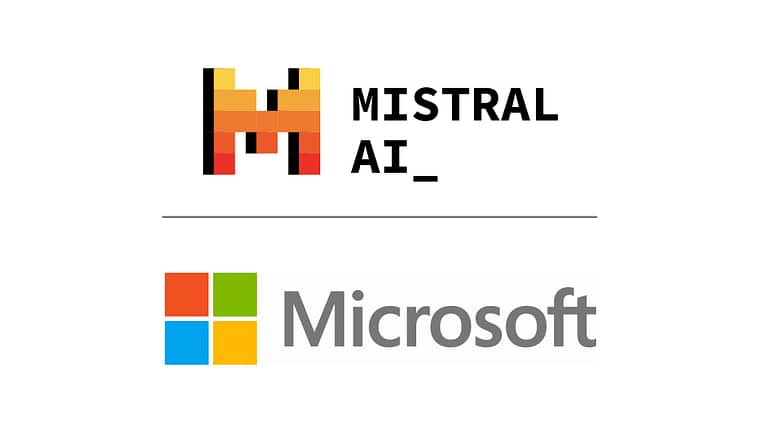19.12.2024
Mistral AI in Microsoft’s Orbit: Europe’s Catch-Up Remains an Open Challenge
Tribune
7 mars 2024

The partnership between French start-up Mistral AI and Microsoft is drawing political criticism in Europe. As a champion of the open-source movement in AI, the company had recently campaigned for a relaxation of the AI Act, before announcing its proprietary U-turn. Nevertheless, its technical success in developing foundation models with limited resources demonstrates the potential for Europe and other global players to catch up. To achieve a degree of autonomy, however, it is still necessary to overcome the difficult economic equation that is driving the most promising start-ups into the arms of Big Tech. An analysis by Rémi Bourgeot, Economist and Associate Fellow at IRIS.
Mistral AI’s Success Highlights the Potential for Technical Catch-Up in the AI Race
Many observers were inclined to think that Europe should limit itself to being a user of US AI models to develop various types of use and applications. Mistral’s success confirms the opportunity for a type of AI that is relatively thrifty compared with what Big Tech is doing in terms of data use as well as financial and human resources.
In the space of just a few months, Mistral AI has managed to develop AI models that rival those of OpenAI, Google and Meta in terms of performance, with resources that are certainly substantial, but incredibly more limited than those of the US giants. This is particularly striking in terms of headcount, with just over thirty employees. This is quite a feat on the part of this team, but it also sheds light on the nature of the technology behind the explosion in generative AI.
In addition to new neural network architectures (transformers), the spectacular advances in AI over the past decade have mainly been linked to the use of phenomenal amounts of data and computing power. While riding this wave of quantitative expansion, Mistral is following the path of finer AI engineering, which has enabled it to establish itself on the world stage in record time.
Against a backdrop of educational crisis and acute deindustrialisation, it is still possible to mobilise skills from the best universities to compete with the world’s tech giants. This technical observation holds important lessons for the global race in this field. It is possible to catch up and compete in AI, provided the necessary funding and opportunities are available over the long term.
Mistral’s Move Towards Microsoft Illustrates the Difficult Economic Equation Facing Open, Independent AI.
After championing open-source models, which can be reused by anyone, Mistral’s executives have decided that their new top-performing model would be proprietary, under a distribution agreement with Microsoft, which is also taking a stake in the company. The open-source route had propelled the company in terms of popularity among developers, alongside other open models such as Meta’s LLaMa, in the face of the now radically closed model of the ill-named OpenAI.
It is precisely on these grounds that Elon Musk, who was involved in OpenAI’s launch, recently announced that he was filing a lawsuit against it. Behind the irony of the exuberant billionaire’s attacks, it is clear that, with its labyrinthine structure, Sam Altman’s company presents a considerable gap between its initial vocation, based on open source and research, and its current purely commercial purpose. The question of Big Tech’s grip on AI is particularly sensitive in Europe, but is obviously also relevant in the United States.
As with OpenAI, Mistral’s agreement with Microsoft confirms its technical success and popularity. In fact, the French company is now offering a chabtbot, called « Le Chat », modelled on ChatGPT. For the time being, however, this partnership is burying the dream of an open-source, independent AI in Europe.
Looking beyond the sharp criticism aimed at the company’s management in recent days, Europe’s economic environment needs to be taken into account. The issue remains that of the prospects for development, funding and market opportunities necessary for a leading position in digital technology. These difficulties and the clout of the digital giants inevitably drive successful start-ups into their ranks. This economic factor has turned Mistral’s technical prowess, which could have marked a turning point towards autonomy, into a strategic setback for Europe.
Beyond the Backlash Against Lobbying, a Flexible Approach to AI Regulation Remains Essential
The AI Act addresses a clear need for regulation and supervision of the risks associated with AI. However, its complicated genesis made the agreement particularly tortuous. Its authors had missed the generative AI revolution and embarked on a titanic task of adaptation last year.
The idea of acting as the world’s digital watchdog, with too little concern for Europe’s technological capability, poses an existential risk to the European economy and its competitive autonomy. Furthermore, given the difficulty of applying it to future technical developments, the AI Act might end up serving the interests of Big Tech, which has the resources to tackle this regulatory labyrinth. Mistral’s entry into Microsoft’s orbit seems to confirm this challenge.
At the end of last year, Mistral campaigned vigorously for the AI Act to be relaxed, particularly with regard to open-source foundation models. Of course, the company had probably already considered moving towards a proprietary model, in partnership with Microsoft. However, the EU’s concessions in response to the objections of the French and German governments, defending their national players like Mistral and Aleph Alpha, mainly concerned open source, which will thus benefit from greater latitude. Despite Mistral’s about-face, its lobbying has resulted in a relaxation of the AI Act that could encourage, under the right economic conditions, the future emergence of its own open-source competitors.